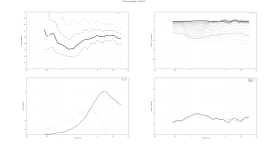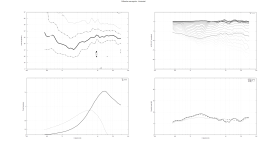In the horizontal polars, you can see that the addition of the curvature has a minor impact:
it smooths out the overall response. This should be audible; flatness through the treble is generally perceived as "sounds good."
If you'd like to do an A/B comparison, you can use the cursor keys on the keyboard to compare the two baffles.
it smooths out the overall response. This should be audible; flatness through the treble is generally perceived as "sounds good."
If you'd like to do an A/B comparison, you can use the cursor keys on the keyboard to compare the two baffles.
Attachments
I actually bought the LS50 Meta just to find out what it felt like listening, measuring and living with a great designed product - also to compare with my DIY project with a KEF R Coax ( 2018 model) between two Satori WO24P - as an "improved" KEF R900 project.
You definitely see that the LS50 Meta is more smooth in the measurements:

And now my DIY project with a more "sharp" edged cabinet and close-by woofers:

Project in its current test-phase cabinet:

All measurements are done on a home-made turntable, with calibrated cross-spectrum mic, Roland quad capture soundboard with loop-back as reference ( optimum phase) - all at around 1 meter in the middle of the room( also height ) - no smoothing but gating around 3 ms, so that the floor bounce is avoided, trying to minimize room influence and obtain most detailed data.
You definitely see that the LS50 Meta is more smooth in the measurements:
And now my DIY project with a more "sharp" edged cabinet and close-by woofers:
Project in its current test-phase cabinet:
All measurements are done on a home-made turntable, with calibrated cross-spectrum mic, Roland quad capture soundboard with loop-back as reference ( optimum phase) - all at around 1 meter in the middle of the room( also height ) - no smoothing but gating around 3 ms, so that the floor bounce is avoided, trying to minimize room influence and obtain most detailed data.

